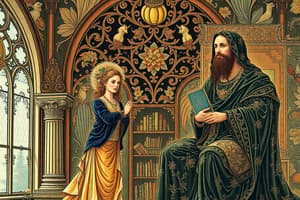Podcast
Questions and Answers
What is the code for the lesson titled "Basic Principles and Concept of Social Science" ?
What is the code for the lesson titled "Basic Principles and Concept of Social Science" ?
SSP 123 -1
Which lesson focuses on the nature, meaning and history of philosophy?
Which lesson focuses on the nature, meaning and history of philosophy?
Lesson 4
What is the code for the lesson "History and Development of Oriental and Western Philosophy"?
What is the code for the lesson "History and Development of Oriental and Western Philosophy"?
SSP 123-6
Eastern Philosophy is a diverse body of approaches to life and philosophizing, particularly centered on understanding the process of the Universe and the endless "becoming".
Eastern Philosophy is a diverse body of approaches to life and philosophizing, particularly centered on understanding the process of the Universe and the endless "becoming".
Western universities commonly focus almost exclusively on Eastern philosophical traditions in their Philosophy departments and courses.
Western universities commonly focus almost exclusively on Eastern philosophical traditions in their Philosophy departments and courses.
Which of the following is NOT one of the names for Confucius?
Which of the following is NOT one of the names for Confucius?
What was the age of Confucius when he died?
What was the age of Confucius when he died?
Confucianism is technically considered a religion.
Confucianism is technically considered a religion.
The Confucianism philosophy is based entirely on what?
The Confucianism philosophy is based entirely on what?
Confucian thought is considered a form of morality organized world.
Confucian thought is considered a form of morality organized world.
Who is credited with founding the philosophical system of Taoism?
Who is credited with founding the philosophical system of Taoism?
What is the key principle in Daoism?
What is the key principle in Daoism?
What does "Tao" mean? (Select all that apply)
What does "Tao" mean? (Select all that apply)
What is the name of the symbol that represents two complementary principles of Chinese philosophy: Yin and Yang?
What is the name of the symbol that represents two complementary principles of Chinese philosophy: Yin and Yang?
What is the name of the person who later became known as "the Buddha"?
What is the name of the person who later became known as "the Buddha"?
Gautama was born into a wealthy family in present-day Nepal.
Gautama was born into a wealthy family in present-day Nepal.
What is the concept that Gautama promoted to find a balance between extremes?
What is the concept that Gautama promoted to find a balance between extremes?
Buddhism is a religion based on a belief in a personal god.
Buddhism is a religion based on a belief in a personal god.
What is the path to enlightenment in Buddhism?
What is the path to enlightenment in Buddhism?
What is the another name for The three signs of existence?
What is the another name for The three signs of existence?
Buddhism spread from China to India some 2,000 years ago.
Buddhism spread from China to India some 2,000 years ago.
What is the name of the symbol that means “well-being” or “good fortune”?
What is the name of the symbol that means “well-being” or “good fortune”?
Western society accepts the truth as given and is more interested in finding the balance.
Western society accepts the truth as given and is more interested in finding the balance.
Western philosophy is often defined as ‘the appearance’ (or increases in popularity) of a specific school of philosophy.
Western philosophy is often defined as ‘the appearance’ (or increases in popularity) of a specific school of philosophy.
What is the name of the tool and method of learning which places emphasis on dialectical reasoning?
What is the name of the tool and method of learning which places emphasis on dialectical reasoning?
Which philosophical school is associated with Jacques Derrida?
Which philosophical school is associated with Jacques Derrida?
Existentialism began in the early 20th century.
Existentialism began in the early 20th century.
Humanism is a Renaissance movement that emphasizes a more human-centered approach to philosophy.
Humanism is a Renaissance movement that emphasizes a more human-centered approach to philosophy.
Marxism is a theoretical-practical framework that focuses on conflicts between the powerful and the subjugated.
Marxism is a theoretical-practical framework that focuses on conflicts between the powerful and the subjugated.
Modernism refers to a reforming movement in a variety of disciplines, primarily in art, architecture, music, literature, and the applied arts.
Modernism refers to a reforming movement in a variety of disciplines, primarily in art, architecture, music, literature, and the applied arts.
Modernism is a recognized movement in philosophy during the late 19th Century and early 20th Century.
Modernism is a recognized movement in philosophy during the late 19th Century and early 20th Century.
Flashcards
Confucianism
Confucianism
A Chinese philosophy emphasizing kindness, mutual respect, and character virtues. It focuses on positive human interaction for societal flourishing.
Taoism
Taoism
A Chinese philosophical tradition emphasizing living in harmony with the Dao (the principle source of everything).
Yin-Yang
Yin-Yang
Two complementary principles in Chinese philosophy: Yin (negative, dark, feminine) and Yang (positive, bright, masculine).
Buddhism
Buddhism
Signup and view all the flashcards
Siddhartha Gautama
Siddhartha Gautama
Signup and view all the flashcards
Eastern Philosophy
Eastern Philosophy
Signup and view all the flashcards
Western Philosophy
Western Philosophy
Signup and view all the flashcards
Confucius
Confucius
Signup and view all the flashcards
Aristotelianism
Aristotelianism
Signup and view all the flashcards
Cynicism
Cynicism
Signup and view all the flashcards
Epicureanism
Epicureanism
Signup and view all the flashcards
Hedonism
Hedonism
Signup and view all the flashcards
Skepticism
Skepticism
Signup and view all the flashcards
Illuminationism
Illuminationism
Signup and view all the flashcards
Scholasticism
Scholasticism
Signup and view all the flashcards
Deconstructionism
Deconstructionism
Signup and view all the flashcards
Existentialism
Existentialism
Signup and view all the flashcards
Humanism
Humanism
Signup and view all the flashcards
Marxism
Marxism
Signup and view all the flashcards
Modernism
Modernism
Signup and view all the flashcards
Study Notes
Social Science and Philosophy SSP 123
- Lesson 1: Basic Principles and Concepts of Social Science (SSP 123-1)
- Lesson 2: Terminologies and theories prevalent within and across disciplines (SSP 123-2)
- Lesson 3: Historical Foundations of the Social Sciences (SSP 123-3)
- Lesson 4: Nature, Meaning, and History of Philosophy (SSP 123-4)
- Lesson 5: Nature of Philosophical Inquiry (SSP 123-5)
- Lesson 6: History and Development of Oriental and Western Philosophy (SSP 123-6)
- Lesson 7: Logic, meaning, fallacies, and good arguments (SSP 123-7)
- Lesson 8: Ethics, Meaning, Division, and Classification (SSP 123-8)
- Lesson 9: Metaphysics (SSP 123-9)
- Lesson 10: Epistemology (SSP 123-10)
Specific Learning Objectives
- Demonstrate understanding of the history and development of Oriental and Western philosophy
- Articulate the different branches of philosophy that developed from Oriental and Western traditions
Oriental Philosophy
- Confucianism and Taoism: Key philosophical concepts, figures (Confucius, Lao-Tzu), core beliefs, and traditions.
- Buddhism and Hinduism: Key figures (Siddhartha Gautama), beliefs and practices, historical/cultural context, and fundamental doctrines.
Western Philosophy
- Movement or School: Introduction to movements and schools like Aristotelianism, Cynicism, Epicureanism, Hedonism, Skepticism, among others.
- Modern Philosophy: Key elements of Modernism, Deconstructivism, Existentialism, Humanism, and Marxism.
Assessment Methods
- Recitation
- Quizzes
- Midterm Examination
References
- Encyclopedia Britannica
- Other online resources for philosophy, including on truth and reality etc.
Studying That Suits You
Use AI to generate personalized quizzes and flashcards to suit your learning preferences.




